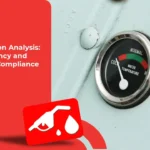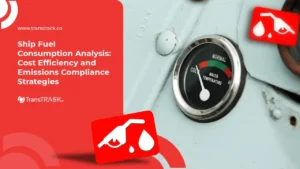Unstable Ups and Downs in Car RPM? Here Are the Causes and Effective Ways to Solve It!
Posted on November 20, 2025 by Nur Wachda Mihmidati

Have you ever experienced the problem of your car’s RPM going up and down unsteadily? When the car engine dies when the RPM is low, it can be a sign that something is happening to the car engine. You need to check the condition of the vehicle if this happens, because if left unchecked, it can cause damage.
To gain more insight into this issue, TransTRACK has summarized it completely for you. In this article, we will explain what car RPM is, common causes of car RPM ups and downs, and how to solve them.
What is Car RPM?
Before we discuss further about car RPM, it is better to understand what car RPM is first. RPM stands for Rotations Per Minute, or in English known as “Revolutions Per Minute. RPM measures how many full revolutions a car engine’s crankshaft makes in one minute.
RPM is an important parameter as it indicates the activity level of the engine. When a car’s RPM goes up and down, it refers to fluctuations in the engine’s rotation speed. A high RPM indicates that the engine is running quickly, while a low RPM indicates a slower engine speed.
Causes of Car RPM Ups and Downs
When the car’s RPM goes up and down unsteadily, it can be a sign that there is a problem with the engine or components of your vehicle. This may seem trivial, but if ignored, it can interfere with driving comfort. One of the problems caused when there is a disturbance in the car’s RPM is that it makes the transmission shift heavier.
Therefore, it is important for you to know the following causes of car RPM ups and downs.
Dirty or Damaged Idle Air Control Valve (IACV)
The Idle Air Control Valve (IACV) is a component that regulates the amount of air entering the engine when the vehicle is idling or running slowly. If the IACV is dirty or damaged, it can cause problems in regulating airflow. As a result, the car’s RPM can go up and down unstable.
Vacuum Leak
Leaks in a vehicle’s vacuum system can lead to unstable RPM issues. The vacuum system plays an important role in regulating air flow to the engine. Leaks in vacuum hoses or components can disrupt the balance of air and fuel entering the engine, causing unstable fluctuations in RPM.
Mass Air Flow (MAF) malfunction
The Mass Air Sensor (MAF) measures the amount of air entering the engine. If the MAF is damaged or dirty, it may give incorrect information to the engine, resulting in an unstable increase or decrease in RPM.
Problems with the Throttle Position Sensor (TPS)
The Throttle Position Sensor (TPS) measures how far the throttle valve is open. If the TPS is faulty, it can disrupt the regulation of air and fuel flow, which in turn can affect the car’s RPM. If the TPS provides incorrect data to the engine, it will cause the car’s RPM to rise and fall erratically.
Spark Plug or Spark Plug Wire Problems
Dirty, worn, or damaged spark plug wires can affect engine performance and cause unstable RPM ups and downs. Spark plug wires are an important part of the combustion process, and problems with spark plug wires or spark plugs can interfere with proper combustion.
How to Solve Car RPM Ups and Downs
If you are facing this problem on an unstable basis, the following steps can help you overcome the problem. Below, we will explain how to solve it in general:
Routine Maintenance
Performing regular car maintenance is the first step to take to solve this problem. This includes regular oil changes, air filter replacement, as well as maintenance of other engine components. An engine that is in good condition is less likely to experience unstable RPM fluctuations.
Check the Idle Air Control Valve (IACV)
If the RPM goes up and down, check the IACV. The IACV controls the airflow when the engine is idling. If the IACV is dirty or damaged, you may need to clean it or replace it. Cleaning or replacing the IACV can help resolve this issue.
Make sure the vacuum is not leaking
If you experience the car’s RPM going up and down, check the vacuum hoses and components to see if there are any leaks. If you find a leak, repair or replace the damaged component immediately so that the RPM returns to normal.
Check Mass Air Sensor (MAF) and Throttle Position Sensor (TPS)
The Mass Air Sensor (MAF) and Throttle Position Sensor (TPS) are important components in regulating the flow of air and fuel to the engine. Make sure these two sensors are functioning properly to keep the RPM stable and avoid damage.
Preventive Maintenance
Performing preventive maintenance can also help prevent unstable RPM fluctuations. Some preventive maintenance that can be done include using high-quality fuel, keeping the air supply system clean, and observing the maintenance schedule recommended by the manufacturer.
Preventing the RPM from Fluctuating
To prevent the car’s RPM from fluctuating, there are several maintenance steps that can be taken to keep the engine stable and working properly. Here are some preventive tips:
1. Routine Vehicle Servicing
Performing regular servicing on your car, including checking the ignition system, fuel system, and other components, can prevent RPM problems. Make sure components such as air filters, spark plugs, and sensors are in good condition to avoid interference with the engine system.
2. Use Quality Fuel
Using inappropriate or low-quality fuel can affect engine performance and cause RPM fluctuations. Always use the fuel recommended by the vehicle manufacturer to maintain engine stability.
3. Electrical System Maintenance
Check the charging system and alternator regularly to ensure a steady flow of electricity. A problematic charging system can cause instability in RPM. Make sure the battery is in good condition and the connecting cables are not loose or damaged.
4. Check and Clean Components that Affect Idle
Components such as the Idle Air Control (IAC) and throttle body should be cleaned regularly to keep the flow of air and fuel to the engine smooth. If these components are dirty or worn, they can cause unstable RPMs.
5. Take Care of Vacuum Leaks
Leaks in the vacuum system can affect sensor readings and cause the car’s RPM to fluctuate. Check the vacuum hose regularly and make sure there are no leaks that could affect engine performance.
6. Check and Replace Problematic Sensors
Sensors such as the MAF (Mass Air Flow), TPS (Throttle Position Sensor), or IAT (Intake Air Temperature) have a huge impact on RPM settings. If one of these sensors is faulty, it can cause RPM fluctuations. Make sure the sensor is working properly and replace it if necessary.
Understanding the causes of car RPM fluctuations is one of the keys to maintaining the health of your vehicle’s engine. When you experience unstable RPM fluctuations, you should immediately have your vehicle checked by a trusted repair shop. A qualified mechanic can perform further diagnosis to identify the root cause of the problem and make the necessary repairs.
To avoid the problem of car RPM fluctuations, you can also consider using TransTRACK’s Vehicle Maintenance System. This system can help you perform routine maintenance on your car more efficiently. With this system, you can monitor your maintenance schedule, oil changes, and other services on a regular basis, thus ensuring that your car stays in optimal condition. Don’t neglect your car maintenance, as preventive measures are much better than coping with more serious damage in the future. So, don’t hesitate to adopt the Vehicle Maintenance System from TransTRACK and enjoy the results in the long run.

FAQ
1. What causes the car’s RPM to fluctuate when the air conditioner is turned on?
When the air conditioner is turned on, the AC compressor adds load to the engine. If the idle control system (IAC valve/ISC), throttle body, or sensors such as MAF/MAP are dirty or malfunctioning, the engine will have difficulty adjusting to the additional load, causing the RPM to fluctuate. Poor electrical conditions (battery or alternator) can also exacerbate RPM fluctuations.
2. Is fluctuating RPM harmful to the engine?
Minor RPM fluctuations are usually harmless. However, if the fluctuations are significant and prolonged, it could indicate a problem with the air sensor, idle control system, vacuum leak, or AC compressor. If left unchecked, this can lead to excessive fuel consumption, excessive vibration, and potential damage to related components.
3. Why does the car’s RPM increase when the car is stationary?
Car RPM can increase when the car is stationary because the engine is compensating for additional load, for example when the air conditioner, lights, or defogger are turned on. RPM can also be higher when the engine is still in the warm-up phase after being turned on. A dirty sensor or throttle body, air leaks in the intake system, or the ECU adjusting the idle speed can also cause the RPM to feel higher than usual.
4. How do you stabilize a car’s RPM?
RPM can be stabilized by ensuring that the throttle body and idle control components remain clean, ensuring that the air sensor is working properly, checking the condition of the battery and alternator, and ensuring that there are no air leaks in the intake hoses. If the throttle body has been recently cleaned, it is often necessary to reset the ECU so that the system can read the idle settings correctly again. Checking the condition of the AC compressor and electrical system can also help maintain a smooth idle.
5. What is the normal RPM of a car when idling?
The normal idle RPM for a car is usually between 650 and 850 RPM for gasoline cars, while diesel cars generally range from 750 to 900 RPM. If the RPM is significantly above or below this range when the engine is warm, this indicates a problem with the idle system or related sensors.
Recent Post
Topic :
 Bahasa Indonesia
Bahasa Indonesia









